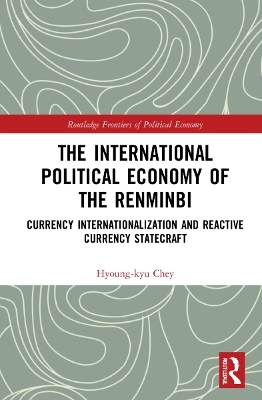
The International Political Economy of the Renminbi
Currency Internationalization and Reactive Currency Statecraft
Seiten
2023
Routledge (Verlag)
978-1-032-07786-4 (ISBN)
Routledge (Verlag)
978-1-032-07786-4 (ISBN)
Although the internationalization of the Chinese renminbi is an important international political event, most of the studies of it place their analytical focuses largely just on China itself, the issuer of the currency. In contrast, this book addresses the question of how foreign states have responded to the renminbi’s internationalization, during its initial phase through the 2010s, and thereby breaks new ground in exploring the international politics of currency internationalization. It builds a theoretical framework for analyzing a state’s policy toward renminbi internationalization, developing the key concept of reactive currency statecraft. It then applies this framework to the four select cases of the United Kingdom, Japan, South Korea and the United States.
This book reveals that all four of these countries have deliberately utilized their policies related to renminbi internationalization as means of achieving their own foreign policy goals associated with China, goals that have been principally economic in some cases but political in others. Remarkably, the predominant mode of response to the renminbi’s internationalization has been accommodative. Even the United States and Japan—China’s chief geopolitical and also international currency rivals—have never attempted to actively suppress it.
This study provides new insights to anyone concerned with the transformation of the world monetary order, while also contributing a valuable analysis of the international politics surrounding the rise of China.
This book reveals that all four of these countries have deliberately utilized their policies related to renminbi internationalization as means of achieving their own foreign policy goals associated with China, goals that have been principally economic in some cases but political in others. Remarkably, the predominant mode of response to the renminbi’s internationalization has been accommodative. Even the United States and Japan—China’s chief geopolitical and also international currency rivals—have never attempted to actively suppress it.
This study provides new insights to anyone concerned with the transformation of the world monetary order, while also contributing a valuable analysis of the international politics surrounding the rise of China.
Hyoung-kyu Chey is Associate Professor of International Political Economy at the National Graduate Institute for Policy Studies (GRIPS) in Tokyo. He is the author of International Harmonization of Financial Regulation? The Politics of Global Diffusion of the Basel Capital Accord (2014).
1.Introduction
2. The Politics of Reactive Currency Statecraft
3. The Rise of the "People’s Currency"
4. The United Kingdom: A Passionate Advocate
5. Japan: A Diplomatic User of the Renminbi
6. South Korea: A Late but Active Accommodator
7. The United States: A Confident Hegemon
8. Conclusion
References
Index
| Erscheinungsdatum | 05.10.2021 |
|---|---|
| Reihe/Serie | Routledge Frontiers of Political Economy |
| Zusatzinfo | 4 Tables, black and white; 2 Line drawings, black and white; 2 Illustrations, black and white |
| Verlagsort | London |
| Sprache | englisch |
| Maße | 156 x 234 mm |
| Gewicht | 680 g |
| Themenwelt | Sozialwissenschaften ► Politik / Verwaltung |
| Sozialwissenschaften ► Soziologie ► Spezielle Soziologien | |
| Wirtschaft ► Volkswirtschaftslehre ► Finanzwissenschaft | |
| Wirtschaft ► Volkswirtschaftslehre ► Makroökonomie | |
| ISBN-10 | 1-032-07786-7 / 1032077867 |
| ISBN-13 | 978-1-032-07786-4 / 9781032077864 |
| Zustand | Neuware |
| Haben Sie eine Frage zum Produkt? |
Mehr entdecken
aus dem Bereich
aus dem Bereich
eine Einführung
Buch | Softcover (2024)
De Gruyter Oldenbourg (Verlag)
CHF 41,90


